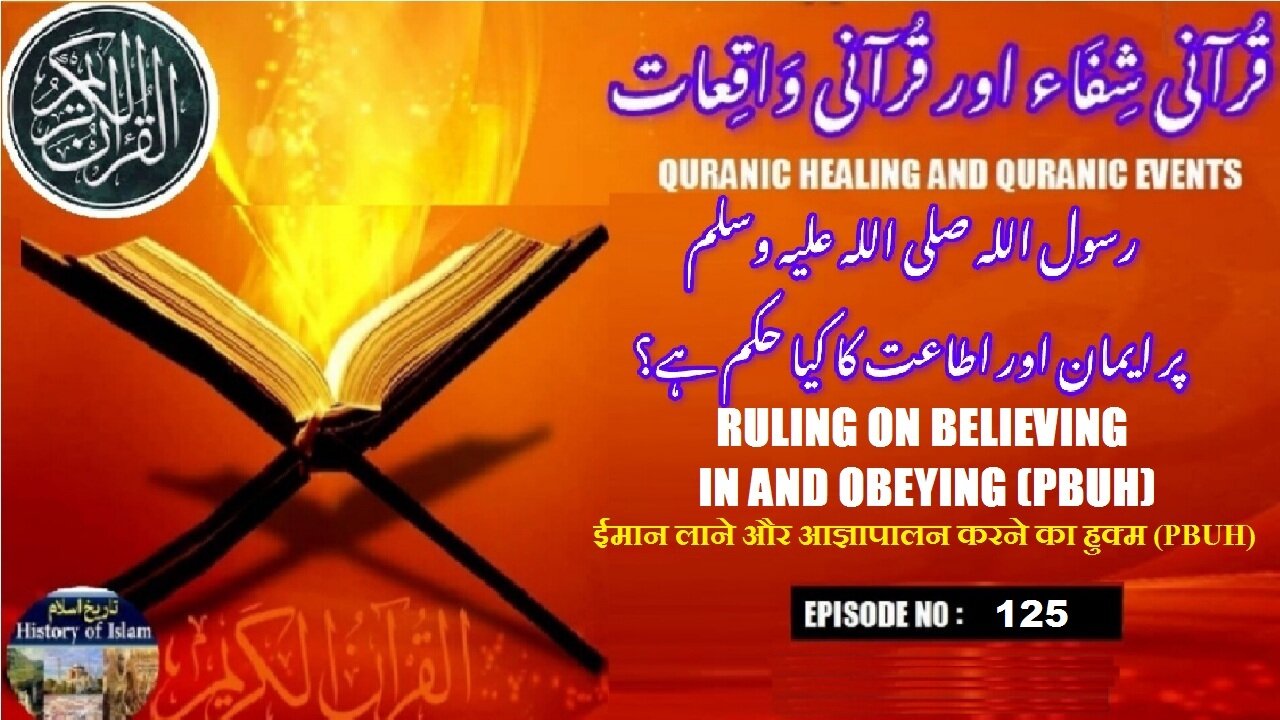Premium Only Content

Ruling on believing in and obeying (PBUH) رسول اللہ صلی اللہ علیہ وسلم پر ایمان اور اطاعت کا حکم
@islamichistory813 #command #given #regarding #belief #obedience #prophet #muhammad #healing #and #events #from #the #quran #historical #stories #and #events #quranicstories #selfhealing #success #stories #striking #events #in #history #quranstories, #storiesfromthequran #religious #creation #stories #trending #quran #short #historical #loves #historical #heroes #what #is #true #strength #calm #quran #recitation #for #babies #islamic #healing
What command is given regarding belief in and obedience to Prophet Muhammad (PBUH)?
Brothers, sisters, friends and elders Assalamu Alaikum, wa Rahmatullahi wa Barakatuhu, we are presenting the 125th episode of the Islamic informative video based on healing and events from the Holy Quran,and in this video we will describe, What command is given regarding belief in and obedience to Prophet Muhammad (PBUH)?
Belief in and obedience to Prophet Muhammad (PBUH) is one of the central pillars of Islam. Allah has made it mandatory for every Muslim not only to believe in the Prophethood of Muhammad ? but also to obey his teachings, follow his example, and accept his decisions without resistance. The Prophet ? is the final messenger, the seal of the prophets, and the perfect example for all of humanity. His life and commands are not optional but binding, and obedience to him is considered obedience to Allah Himself.
One of the clearest commands regarding belief in and obedience to the Prophet (PBUH) is found in Surah An-Nisa verse 59:
"O you who have believed, obey Allah and obey the Messenger and those in authority among you. And if you disagree over anything, refer it to Allah and the Messenger if you should believe in Allah and the Last Day. That is the best [way] and best in result."
This verse lays out a clear structure of obedience. First and foremost, obedience is due to Allah and His Messenger (PBUH). Then, those in legitimate authority are to be obeyed as long as their commands align with the Qur'an and Sunnah. In case of any dispute or confusion, believers are instructed to refer the matter back to the Qur’an and the Sunnah of the Prophet (PBUH), not to their personal opinions or social trends. This verse is a foundational principle of Islamic law and governance.
Another important command is in Surah Al-Imran verse 31:
"Say, [O Muhammad], 'If you should love Allah, then follow me, so Allah will love you and forgive you your sins. And Allah is Forgiving and Merciful.'"
This verse highlights that true love for Allah is demonstrated through following the Prophet ?. Mere claims of love or belief are not enough; they must be proven by complete obedience to the Prophet’s ? teachings. The reward for such obedience is Allah’s love and forgiveness—two of the greatest gifts a believer can receive.
In Surah An-Nur verse 63, Allah warns sternly:
"So let those beware who dissent from his [i.e., the Prophet’s] order, lest fitnah (trial) strike them or a painful punishment."
This verse makes it clear that opposing the commands of the Prophet (PBUH) is a dangerous act, leading either to misguidance in this world or punishment in the Hereafter. The Prophet’s (PBUH) authority is not based on personal opinion but on divine revelation from Allah, and thus, disobeying him is equivalent to disobeying Allah.
The Hadith also supports this divine command. In Sahih al-Bukhari, Hadith 7280, the Prophet (PBUH) said:
"Whoever obeys me, obeys Allah; and whoever disobeys me, disobeys Allah."
This hadith directly connects the Prophet’s authority to Allah’s command. There is no separation between obedience to Allah and obedience to the Messenger ?. A true believer submits completely to both the Qur’an and the Sunnah without picking and choosing.
Another narration in Sahih Muslim, Hadith 1835, mentions:
"All of my Ummah will enter Paradise except those who refuse."
The companions asked, "O Messenger of Allah, who would refuse?" He said, "Whoever obeys me will enter Paradise, and whoever disobeys me has refused."
This hadith emphasizes that obedience to the Prophet (PBUH) is the key to salvation. Disobedience is equivalent to rejecting the path to Paradise.
In conclusion, belief in and obedience to Prophet Muhammad ? is not just a matter of faith, but a divine obligation. Allah has commanded believers to follow the Prophet ? in all aspects of life. His Sunnah is a living interpretation of the Qur’an and a guide for all generations. Obedience to him brings Allah’s love, mercy, and forgiveness, while disobedience leads to misguidance and punishment. A Muslim’s success in this life and the Hereafter depends on their commitment to following the Prophet (PBUH) wholeheartedly.
With this, we ask for your permission until tomorrow and pray to Allah Almighty to grant us the ability to act on the Quran and Hadith, Amen
Allah Hafiz
===================================
-
 6:17
6:17
ISLAMIC HISTORY
33 minutes agoAbu Bakr Muhammad ibn Khair ibn Umar سوانح ابو بکر محمد بن خیر ابن عمر بن خلیفہ الاسبیلی
1 -
 40:44
40:44
SouthernbelleReacts
6 days ago $0.99 earned“Event Horizon (1997) Reaction | Hellraiser in Space with Sam Neill & Laurence Fishburne”
10.9K2 -
 10:49
10:49
Artur Stone Garage
3 days ago $0.41 earnedI Spent $2000 on My Turbo Honda Civic Build (Before & After)
15.8K5 -
 0:44
0:44
Danny Rayes
15 hours ago $0.53 earnedDid Someone Know It Was Going To Happen?
12.7K2 -
 15:03
15:03
World2Briggs
22 hours ago $1.79 earnedShocking Home Prices in Florida's Cheapest Towns!
16.1K2 -
 58:02
58:02
ChopstickTravel
4 days ago $0.09 earnedBillionaire Food in Dubai 🇦🇪 Super Luxury MICHELIN +WAGYU + CAVIAR in UAE!
12.1K -
 21:20
21:20
Advanced Level Diagnostics
12 days ago $0.40 earned2020 Toyota Sienna - Crank No Start! Never Seen This Before!
16.9K1 -
 49:04
49:04
The Why Files
6 days agoMajestic 12 | Secret Documents Expose UFO Cover-Up Vol. 1
47.5K68 -
 12:29
12:29
The Quartering
19 hours agoFBI Admits ACCOMPLICE In Charlie Kirk Assassination! Ring Doorbell Camera Footage & Phone Calls!
132K443 -
 30:41
30:41
Crowder Bits
1 day agoEXCLUSIVE: Charlie Kirk Eyewitness Details Shooting "Sacrifice Your Life For What You Believe In."
57.9K133